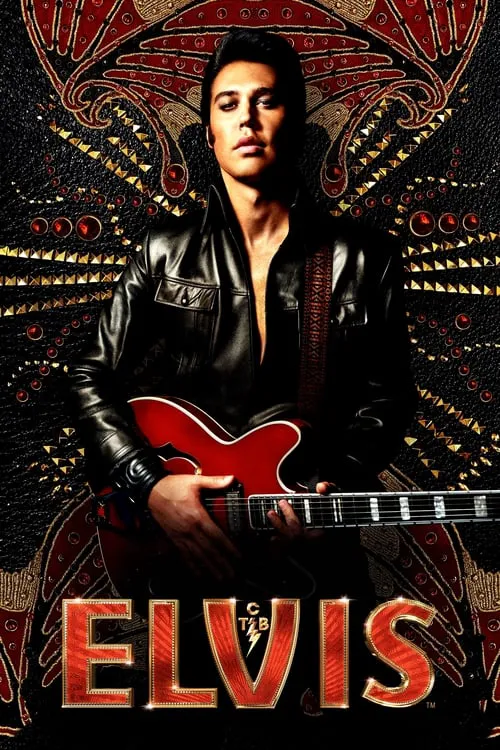Elvis

Plot
The 2022 biographical drama film, Elvis, delves into the life story of the King of Rock 'n' Roll, Elvis Presley, with a unique focus on his intriguing and often contentious relationship with his self-proclaimed manager, Colonel Tom Parker. Directed by Baz Luhrmann and written by Luhrmann, Craig Pearce, and Sam Bromell, the film presents a captivating narrative of love, loss, and artistic empowerment, exploring the highs and lows of Elvis's career while offering an unflinching portrayal of the tumultuous partnership with his manager. The movie opens with a dramatic and pivotal event in Elvis's life: the meeting with Colonel Tom Parker, an enigmatic figure with a quiet, reserved demeanor and an air of mystery surrounding him. Col. Parker, a Dutch-American businessman, is initially hesitant about taking on Elvis as a client, concerned about the young musician's seemingly unwavering dedication to his artistic vision. However, after witnessing Elvis's raw, emotive talent during a gig at the Overton Park Shell in Memphis, Parker is persuaded to assume a central role in Elvis's ascending career. As Elvis's popularity ascends, he and Col. Parker engage in an intricate dance of mutual dependence and creative tension. The manager, a skilled negotiator with an astute business acumen, wields significant control over Elvis's professional decisions, often prioritizing the interests of the larger recording companies and the media over the artist's personal and artistic ambitions. Elvis, driven by his emotional vulnerability, fuses with Parker on an almost telepathic level, entrusting him with his most personal and creative endeavors. Throughout the narrative, Elvis's internal conflict becomes increasingly pronounced, threatening to derail his meteoric rise. As his fame intensifies, so do the pressures he faces from the stifling norms of 1950s America. Faced with the prospect of pandering to the tastes of Southern folk or breaking free from societal expectations, Elvis internalizes the duress, often testing the boundaries of his relationship with Col. Parker. The entanglement evolves into an existential dilemma, with Elvis caught between loyalty to his manager, who has bankrolled his entire career, and his own need for creative authenticity. On the surface, Col. Parker appears as a quietly ruthless facilitator of Elvis's success, dictating and shaping his trajectory to maximize profit for both himself and the recording companies. Beneath this facade, however, lies an intriguing complexity: Parker, driven by his own insecurities and sense of otherness as an immigrant, experiences an unshakeable connection to Elvis, harkening back to a shared sense of vulnerability and loneliness. This affinity fosters a father-son dynamic, with Parker walking the thin line between business and paternal guardianship. As Elvis navigates the pressures of fame, his personal life becomes increasingly complex. He marries Priscilla Presley, a young beauty from a different social universe, who faces relentless scrutiny and competition from the fame-hungry individuals and women surrounding Elvis. A heart-wrenching subtext underscores their relationship, poignantly conveyed through the poignant performance of Austin Butler and Olivia DeJonge. Elvis, ultimately torn between love and rebellion, seeks refuge in escapism through his music and his relationship with Priscilla. Meanwhile, Col. Parker remains vigilant, offering careful yet constant guidance through Elvis's escalating professional trajectory. Parker's emotional attachment to Elvis deepens, prompting flashbacks that illuminate key junctures in Parker's own life story: his hardscrabble beginnings, the emotional struggles of displacement, and the eventual integration into Elvis's world. The juxtaposition of the disparate protagonists forces a profound introspection, inviting viewers to contemplate the tension between commerce and artistry, the instability of human relationships, and the long-lasting costs of ambition. The biopic expands outward as Elvis's career achieves dizzying heights, yielding epic showdowns and concert records. The songs which rise from his vulnerability serve as beacons of courage, mirroring his quest for self-expression and authenticity amidst commercial considerations and societal censure. Notably, Elvis chooses to distance himself from Parker's attempts to manage his persona and mitigate controversy, ultimately electing to reconnect with his art form through the music itself. Throughout the intense and elegiac experiences depicted within the film, Parker's stoic determination gives way to a grudging acceptance of Elvis's growing need for autonomy. Parker acknowledges the toll Elvis's excessive dependence has taken on his life and implicitly understands that his enigmatic figure will soon be replaced by the artist's burgeoning maturity and self-reassurance. This mutual concession leaves an inescapable question hanging in the air: Would their mercurial relationship have proven capable of bridging the chasm separating Parker's economic acumen from Elvis's creativity and personal drive? Ultimately, Elvis and Col. Parker's complex relationship transcends a simplistic good vs. evil binary, recognizing them as inextricably tied figures, oscillating between devotion and control. In this elegantly constructed biopic, Luhrmann, Pearce, and Bromell immerse viewers in Elvis's captivating narrative, illuminating the fault lines of his partnership with Parker while revealing the fragile threads that sustained their intricate dance.
Reviews
Recommendations




